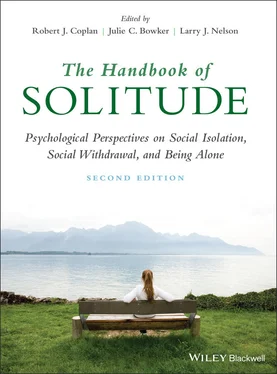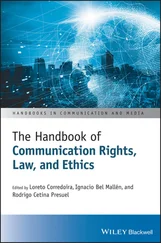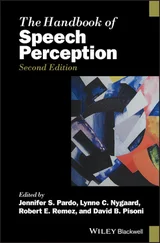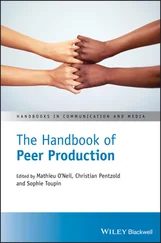459 464
460 465
461 466
462 467
The Handbook of Solitude
Psychological Perspectives on Social Isolation, Social Withdrawal, and Being Alone
Second Edition
Edited by
Robert J. Coplan
Carleton University
Ottawa, ON
Canada
Julie C. Bowker
University at Buffalo, SUNY
Buffalo, NY
USA
Larry J. Nelson
Brigham Young University
Provo, UT
USA

This edition first published 2021
© 2021 John Wiley & Sons, Inc.
Edition History John Wiley & Sons, Inc. (1e, 2014)
All rights reserved. No part of this publication may be reproduced, stored in a retrieval system, or transmitted, in any form or by any means, electronic, mechanical, photocopying, recording or otherwise, except as permitted by law. Advice on how to obtain permission to reuse material from this title is available at http://www.wiley.com/go/permissions.
The right of Robert J. Coplan, Julie C. Bowker, and Larry J. Nelson to be identified as the authors of the editorial material in this work has been asserted in accordance with law.
Registered Office John Wiley & Sons, Inc., 111 River Street, Hoboken, NJ 07030, USA
Editorial Office 111 River Street, Hoboken, NJ 07030, USA
For details of our global editorial offices, customer services, and more information about Wiley products visit us at www.wiley.com.
Wiley also publishes its books in a variety of electronic formats and by print‐on‐demand. Some content that appears in standard print versions of this book may not be available in other formats.
Limit of Liability/Disclaimer of Warranty While the publisher and authors have used their best efforts in preparing this work, they make no representations or warranties with respect to the accuracy or completeness of the contents of this work and specifically disclaim all warranties, including without limitation any implied warranties of merchantability or fitness for a particular purpose. No warranty may be created or extended by sales representatives, written sales materials or promotional statements for this work. The fact that an organization, website, or product is referred to in this work as a citation and/or potential source of further information does not mean that the publisher and authors endorse the information or services the organization, website, or product may provide or recommendations it may make. This work is sold with the understanding that the publisher is not engaged in rendering professional services. The advice and strategies contained herein may not be suitable for your situation. You should consult with a specialist where appropriate. Further, readers should be aware that websites listed in this work may have changed or disappeared between when this work was written and when it is read. Neither the publisher nor authors shall be liable for any loss of profit or any other commercial damages, including but not limited to special, incidental, consequential, or other damages.
Library of Congress Cataloging‐in‐Publication Data
Names: Coplan, Robert J., 1967– editor. | Bowker, Julie C., editor. | Nelson, Larry J., editor. | Wiley‐Blackwell (Firm), publisher.
Title: The handbook of solitude : psychological perspectives on social isolation, social withdrawal, and being alone / edited by Robert J. Coplan, Julie C. Bowker, Larry J. Nelson.
Description: Second edition. | Hoboken, NJ : Wiley‐Blackwell, 2021. | Includes bibliographical references and index.
Identifiers: LCCN 2021006669 (print) | LCCN 2021006670 (ebook) | ISBN 9781119576389 (hardback) | ISBN 9781119576426 (adobe pdf) | ISBN 9781119576853 (epub)
Subjects: LCSH: Solitude. | Social isolation. | Loneliness.
Classification: LCC BF637.S64 H36 2021 (print) | LCC BF637.S64 (ebook) | DDC 155.9/2–dc23
LC record available at https://lccn.loc.gov/2021006669LC ebook record available at https://lccn.loc.gov/2021006670
Cover Design: Wiley
Cover Image: © kasayizgi/Getty Images
Part I Theoretical Perspectives
1 Alone Again: Revisiting Psychological Perspectives on Solitude
Robert J. Coplan 1, Julie C. Bowker 2, and Larry J. Nelson 3
1Carleton University, Canada
2University at Buffalo, The State University of New York, USA
3Brigham Young University, USA
Editors’ Note: Solitude in the Time of COVID‐19
Almost all the chapters for the second edition of the Handbook of Solitude were written before anyone had heard of COVID‐19. The catastrophic implications of this global pandemic will be felt for years to come. Among the immediate effects of the lockdowns that were instituted in countries around the world to combat the spread of the virus, millions of individuals were thrust into unwanted solitude, or confined to home environments where, for various reasons, it was almost impossible to find a moment to spend alone. At the time of this writing, it is still not clear how long such conditions will continue. Never has it been more important to consider the causes and consequences of solitude for our well‐being and mental health. We are hopeful that the new edition of this volume contributes a wide range of informed perspectives to these ongoing discussions.
Rob Coplan, Julie Bowker, and Larry Nelson
Alone Again: Revisiting Psychological Perspectives on Solitude
The experience of solitude is a ubiquitous phenomenon. Over the course of the life span, humans experience solitude for many different reasons and subjectively respond to solitude with a wide range of reactions and consequences. Some people may retreat to solitude as a respite from the stresses of life, for quiet contemplation, to foster creative impulses, or to commune with nature. Others may suffer the pain and loneliness of social isolation, withdrawing or being forcefully excluded from social interactions.
These exemplars illustrate the complex nature of solitude and its relation to well‐being – and speak to what has been deemed the paradox of solitude . Indeed, theorists and researchers haver highlighted several different paradoxical aspects of solitude over the years, including: (1) despite the widely held beliefs that solitude serves self‐enhancing functions, it is often experienced as unwelcome and painful; (2) time alone can serve as both a reward (“me time”) and a punishment (time outs, solitary confinement); (3) solitude is viewed as both normative as well as a cause and consequence of psychopathology; (4) time alone can both interfere with and improve our relationships with others; and, as we will discuss in some detail herein; (5) solitude can simultaneously confer both costs and benefits for our well‐being (Coplan et al., 2018; Galanaki, 2015; Merton, 1958; Larson, 1999).
It should also be noted that there is little consensus among researchers as to how solitude should be conceptualized, operationalized, and assessed. For example, some perspectives emphasize physical separation from others, although in some cases this becomes operationalized in varied ways. For example, participants might be required simply to sit and think away from others (Wilson et al., 2014), whereas in other studies the focus is on activities while participants are physically alone (Leary et al., 2003). Of note, there is really no agreed‐upon physical “distance” from others that is mandated in order for an individual to be considered alone. Other perspectives focus on perceived separation from others (Larson, 1990). In this regard, participants might report feeling alone and lonely even in the presence of others (van Roekel et al., 2015). Coplan and Bowker (2017) described this conceptual distinction as solitude representing a state of mind rather than a state of being . Finally, as we will discuss later, contemporary technology now makes it possible (and common) for us to be physically alone but in the virtual presence of – and interacting with – many others (Hollis et al., 2020).
Читать дальше





![О Генри - Справочник Гименея [The Handbook of Hymen]](/books/407356/o-genri-spravochnik-gimeneya-the-handbook-of-hymen-thumb.webp)







